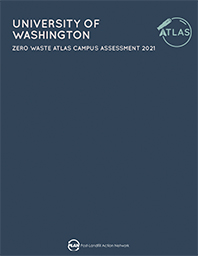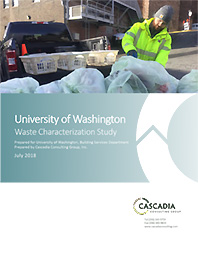“The National Recycling Strategy recognizes the need to implement a circular economy approach for all – reducing the creation of waste with local communities in mind and implementing materials management strategies that are inclusive of communities with environmental justice concerns. ” -EPA: National Recycling Strategy
The term "circular economy" refers to a state in which products that have reached the end of their useful lives become resources for creating new products.
Our goals
The UW Sustainability Action Plan calls for the UW to reduce the amount of solid waste we send to recycling, compost and landfill 10% from 2019 levels by 2025. By working to reduce overall waste rather than simply increase the rate of waste going to recycling and compost, we recognize the importance of avoiding over consumption. In order to truly work toward a circular economy, we need to look at the full life cycle of materials, identify opportunities to re-use existing materials rather than purchasing new and also avoid purchasing unnecessary items.

What we're doing
- Educating: UW Recycling offers many educational and outreach materials to help campus reach our goal, including in-person Trash Talks, an online Bridge training course for UW staff and a Waste 101 online course for students.
- Encouraging re-use: UW Surplus takes all unwanted items from all UW departments and medical facilities to reuse, repurpose or recycle as many items as possible. They make items available through their physical and online stores. The Surplus store is open to the public each Tuesday. UW Departments and non-profit groups can visit by appointment.
- Redirecting unwanted items: UW Recycling supports a yearly event, Student Cleanup, Recycle and Moveout (SCRAM) to help students donate items they no longer need when they move out of student housing in June.
- Reusable containers: While nearly all take-out food packaging through HFS Dining is compostable, often those compostable materials are improperly disposed of and end up in the landfill. To reduce this, HFS provides reusable OZZI take-out containers to all students with a dining plan. These containers can be exchanged for new ones, and are then cleaned and re-used.
- Composting: The city of Seattle prohibits compostable food and paper in the garbage, and the UW has compost bins available across campus to keep these items out of the landfill. We also compost leaves from campus on site for use in campus groundskeeping.
- Innovative reuse: The Salvage Wood Program takes the lumber from trees that need to be removed on campus so it can be use in UW projects. A sawmill and solar-powered kiln were purchased with Campus Sustainability Fund (CSF) grants so that the trees can be processed and stored for future projects.

A variety of items sold through the UW Surplus store.
Academics & research
The Circular City + Living Systems Lab (CCLS) investigates transformative strategies for future cities including circular economy strategies.
The Food Systems Network brings together UW experts from multiple disciplines to address food systems challenges and develop new food systems research and education initiatives at local and global levels.
Just Circular Communities "is an interdisciplinary collaborative that seeks to envision and implement localized, regenerative, and community-driven circular systems for a Just Transition – by, with, and for Frontline communities."





